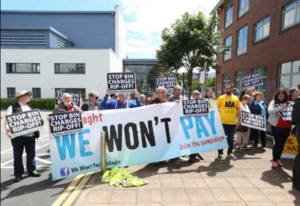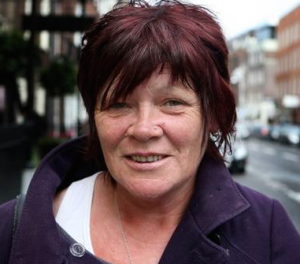

From top: Protesters outside South Dublin County Council in Tallaght yesterday and Independents 4 Change TD Joan Collins
Joan Collins writes:
How have we, as a society, reached the point where nine of the country’s largest waste firms have re-registered their Irish companies as unlimited, meaning they no longer have to file their public accounts?
Seven of those have also created ownership structures involving offshore locations that hide their financial affairs behind an impenetrable veil of secrecy.
So when these companies and their apologists come on the airwaves and say they are losing money, how do we know? Will they open their real books to the public?
If (highly unlikely) they are losing money and they cannot provide the most basic service a country needs, the Government should take back the control of our waste collection and disposal in its entirety using best practice in other European countries where, in many cases, people receive financial incentives to re-use and recycle.
When Alan Kelly introduced the statutory instrument (secondary legislation) of the waste service legislation and set a mandatory minimum price of 11c per kilo black bin lift and 6c per kilo brown bin lift, under the “polluter pays” principle (the less landfill a household disposes of the less a household pays), surely he knew the waste companies would use the opportunity to ensure their profits (if we knew what they were) would be protected.
Enda Kenny, in his reply to me during Leaders’ Questions last week, stated that 87% of households would be paying less under the new charges and that, in the “spirit” of recycling, companies would compete and bring down their prices.
You would wonder what planet Mr Kenny lives on, these private monopolies do not have a good reputation in providing cheap and cheerful waste collection services.
Myself, Cllr Pat Dunne and other activists supported the locked out Greyhound workers in June 2014.
Over 80 men, many who carried their pay and conditions under TUPE, were locked out of their jobs when they would not accept the draconian cuts in their pay and conditions. We ended up in the courts because we disrupted the Buckley brothers’ collection service.
They had no problem in spending big money in seeking injunctions in the courts and bringing activists to the courts as well.
Many of these workers were replaced by agency workers on much lower wages and conditions.
The Buckley brothers, at the time, said they had to bring their costs down. When myself and Clare Daly raised the issue of health and safety and working conditions at the time the then Minister for jobs, Richard Bruton stated that he would request the labour court to investigate it.
We will continue to pursue this.
Competition has increased the waste charges exorbitantly. 11c per kilo for the black bin has turned into 35c with Greyhound, 35c with Thornton’s and 27c plus a pick-up charge of €3.20 with Panda. 6c per kilo for the brown bin has turned into 23c with Greyhound, 20c with Thornton’s and 16c plus a pick-up charge of €2.56 with Panda.
These companies have hiked up their annual service charge from €59.95 to €169 with Greyhound, from €50 to €104 with Thornton’s and Panda has increased it up to €86. There is also a charge of €40 to switch your collector from Greyhound to Thornton’s.
For low income families, people who are ill, those who need to use incontinent nappies and the elderly will see hikes of 75% to 200%. For example, a woman, who is a carer for her 89-year-old Mum who has Alzheimer’s calculated that her annual bin charges will soar from €274.80 to €497.50 for the same number of lifts: she stated the new system “is an absolute disaster, Mum used to get the waiver, our black bin is largely full of Mum’s pull-ups (diapers) and they weigh a lot”.
That is an increase of €4.28 per week. From many examples that I have received from households using Greyhound and Panda, when you do the maths, it works out more.
So, competition is increasing the charges. The “recovery” means more of the same austerity for the majority of people while wealthy families continue to protect their wealth.
It was announced this morning that private waste companies have agreed to a 12-month freeze on current bin charge rates.
But how did we get here?
Between 1995 and 2001 many of the TDs currently in the Dáil were on councils all over the country and implemented the FF/Green policy of privatising their waste services. They handed over the most fundamental and necessary service in society, the collection and disposal of waste, to private companies.
When the four councils in Dublin, in 2001, brought in a charge for the collection of waste, the Campaign Against the Bin Tax was initiated. The greater Dublin area, DCC, Cork and Galway were the last of the councils to bring the charges in.
The councils brought in waivers for households who received social welfare payments, Local Authority flat complexes were excluded (a year after the collection was privatised these exemptions were gone). A divide and conquer strategy by the councils ensued.
Many households refused to pay and joined the boycott campaign, in the knowledge that if/when the councils had a compliant level of payment the service would become lucrative to tender to private companies.
There wasn’t a mass resistance but there was a sizeable boycott campaign, particularly in working class areas. A membership card was produced and households paid an annual membership fee (to represent people in court cases).
The councils pursued non-payers through the courts, the campaign challenged the waste legislation, one of the campaign members from Crumlin went to the Supreme Court.
We lost, not on the principle, but on the basis that the legislation should have been challenged through the courts within a specific period from the introduction of the legislation but we were outside of that time period.
When the council stopped collecting waste from non-payers, a campaign of householders throwing their own waste into the trucks began, appeals were made to the workers, many who were not paying either, but their unions SIPTU and IMPACT did not support the boycott.
I took a half day every day, from my holidays, for two weeks to head out at 6.30am with the trucks and demonstrated that we could throw our waste into the trucks.
The councils went to the courts and got an injunction that non-workers could not interfere with the trucks. We could walk beside them but not “interfere” with them. The councils did not implement the injunction unilaterally but strategically picked areas to impose it to break the campaign. People began blocking the trucks demanding they pick up bins.
Hundreds of names were taken by the guards and 24 people were jailed from all over the city. Mass demonstrations took place supporting the jailed activists.
In the Dublin 12 area householders took the decision to meet on Saturday mornings to bring their waste down to Davitt Road waste depot and leave it at the gates in protest.
Again the guards were called to stop “illegal dumping” as the council claimed. Again people, including myself, were done under the Litter Act.
As a testament to the deep and strong objection to the non-collection of our waste, 10 years on, people still meet every Saturday at 11am to dispose of their waste in an organised fashion at the depot. I attend these protests every week.
Today we see the outcome of the Government’s action against the huge resistance to the privatisation of our waste services. Many of these companies moved their accounts to the Isle of Man, the British Virgin Islands and New Zealand just before or just after they won the tenders from the local authorities.
That is why I made the point in the Dáil that a cartel was being run by the waste companies. I listened intently to Michael Kilcoyne, a representative from the Consumer Association of Ireland on the radio last Friday.
His words were bang on when he made clear that the same parties and TDs, now so vocal on the issue, were the same who voted and supported our services being privatised. His position is that this day was inevitable.
I warned Enda Kenny that the last time practically every household was visited by an austerity charge, it was the water charges and that his Government will be met with the same resistance if his Government does not, for the moment:
- Set the minimum charge as a maximum charge.
- Set annual charges to stay in line with the consumer price index
- Set waivers for social welfare recipients and low income families
- In the meantime set up a commission of investigation into the waste industry and for local authorities to get back into waste collection and disposal
Joan Collins is an Independents 4 Change TD for Dublin South-Central.
Earlier: Resolving The Bin Charges Debacle
Rollingnews








